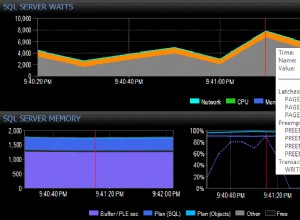A partir do PostgreSQL 9.4, você pode usar o
? operador:select info->>'name' from rabbits where (info->'food')::jsonb ? 'carrots';
Você pode até indexar o
? consulta no "food" chave se você mudar para o jsonb digite em vez disso:alter table rabbits alter info type jsonb using info::jsonb;
create index on rabbits using gin ((info->'food'));
select info->>'name' from rabbits where info->'food' ? 'carrots';
Claro, você provavelmente não tem tempo para isso como um guardião de coelhos em tempo integral.
Atualização: Aqui está uma demonstração das melhorias de desempenho em uma mesa de 1.000.000 coelhos, onde cada coelho gosta de dois alimentos e 10% deles gostam de cenouras:
d=# -- Postgres 9.3 solution
d=# explain analyze select info->>'name' from rabbits where exists (
d(# select 1 from json_array_elements(info->'food') as food
d(# where food::text = '"carrots"'
d(# );
Execution time: 3084.927 ms
d=# -- Postgres 9.4+ solution
d=# explain analyze select info->'name' from rabbits where (info->'food')::jsonb ? 'carrots';
Execution time: 1255.501 ms
d=# alter table rabbits alter info type jsonb using info::jsonb;
d=# explain analyze select info->'name' from rabbits where info->'food' ? 'carrots';
Execution time: 465.919 ms
d=# create index on rabbits using gin ((info->'food'));
d=# explain analyze select info->'name' from rabbits where info->'food' ? 'carrots';
Execution time: 256.478 ms




